
Heinrich Timmerevers (born 25 August 1952) is a German prelate of the Catholic Church. A bishop since 2001, he has been the 50th Bishop of Dresden-Meissen since 2016.

Heinrich Timmerevers (born 25 August 1952) is a German prelate of the Catholic Church. A bishop since 2001, he has been the 50th Bishop of Dresden-Meissen since 2016.
Timmerevers was born in Nikolausdorf in Kreis Cloppenburg in Lower Saxony, Germany, on 25 August 1952, the second of six children in a family of farmers in an all-Catholic community. He attended Clemens-August-Gymnasium in Cloppenburg. He studied theology and philosophy at the University of Münster and at University of Freiburg. He wa ordained a priest on 25 May 1980. From 1980 to 1984 he worked as vicar in Visbek. From 1984 to 1989 he was vice-director of the theology college in Münster and cathedral vicar. [1] He then returned to parish work in Visbek in 1990. [2]
On 6 July 2001, Pope John Paul II appointed him titular bishop of Tulana and Auxiliary Bishop of Münster. [3] He received his episcopal consecration on 2 September 2001 from Reinhard Lettmann, Bishop of Münster. In accordance with local practice, he led the Oldenburg region based in Vechta as an "enclave diocese" more in the manner of an ordinary than an auxiliary. He also met regularly with the evangelical bishop of Oldenburg. He advocated for the liberalization of Germany's immigration policies to "show Germany as an open country" and on behalf of refugees and Christians persecuted in the Middle East. He said that "attitudes that spring from right-wing extremist ideology have no place in the Church". [1]
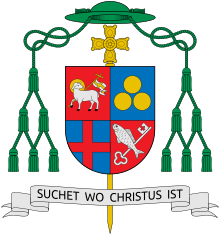
On 29 April 2016, Pope Francis named him Bishop of Dresden-Meissen. [4] Following his appointment, in interviews he underscored his commitment to developing a welcoming culture toward immigrants and friendly relations with Protestants. [5] He advocated for attempting to maintain dialogue with the nationalist anti-Islamic party, Pegida, which was founded in Dresden, his new home city, but said there were limits to what could be debated: "If someone disdains other people by skin color or religion, then I say, that's not okay. No one has the right to deny another person his inviolable dignity. That must be the basic consensus. Communicating this attitude is a Christian duty, but also generally a human duty in our society. That is what we have to do, not least because of our German history." [6] He was installed as Bishop of Dresden-Meissen on 27 August 2016. [2]
In November 2019 he told the Synod of the German Evangelical Church that churches that hear "cries for justice and peace" must "side radically with the poorest". He praised the warm relationship among the Christian churches in Germany and asked for their support as the Catholic Church continued to address clerical sexual abuse in the Catholic Church. [7] In a speech in Leipzig in December 2019 at the beginning of the German bishops' national synod process, Timmerevers identified the status of women as the Church's "great dilemma", serious enough to threaten Church unity. He said: "What I perceive hurts me very much, in three respects: that many women suffer, that this question has a potential to divide our church and that we bishops are held liable for it." He said he was open to allowing some priests to marry though he considers celibacy the ideal. [8]
Timmerevers is a member of the Focolare Movement, which is dedicated in social cohesion and dialogue. [1] Within the German Bishops Conference he was a member of the Youth Commission for eight years and has served on other committees for more than a decade, including those for Consecrated Life and Spiritual Professions. Since 2016 he has been a member of the Pastoral Commission and of the Joint Conference of the Bishops Conference and the Central Committee of German Catholics. [2] Since January 2012 he has performed pastoral work on behalf of the Order of Malta and served on its national governing board. [9]
In September 2020, Timemrevers supported Blessing of same-sex marriages in Roman-Catholic Church. [10] [11]
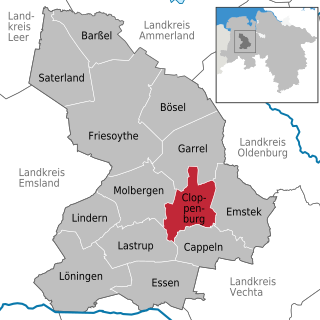
Cloppenburg is a town in Lower Saxony, Germany, capital of Cloppenburg District and part of Oldenburg Münsterland. It lies 38 km south-south-west of Oldenburg in the Weser-Ems region between Bremen and the Dutch border. Cloppenburg is not far from the A1, the major motorway connecting the Ruhr area to Bremen and Hamburg. Another major road is the federal highway B213 being the shortest link from the Netherlands to the A1 and thus to Bremen and Hamburg.

The Oldenburg Münsterland, otherwise called Oldenburger Münsterland or Oldenburgisches Münsterland, is a region in Lower Saxony, Germany and the administrative area that comprises the federal districts of Cloppenburg and Vechta. It forms the southern part of the historical region of Oldenburg Land, so it is also called Südoldenburg. The inhabitants of the region accordingly call themselves Südoldenburger, with the denominative Oldenburger Münsterländer being rather uncommon.
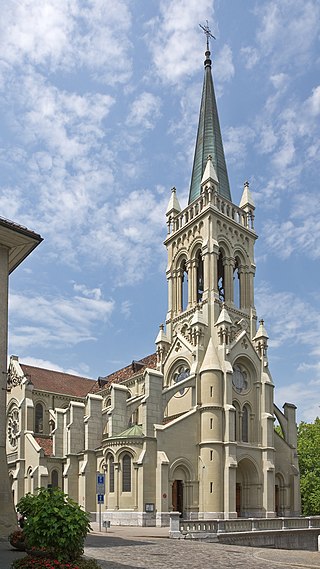
The Christian Catholic Church of Switzerland is an Old Catholic denomination in Switzerland. This denomination is part of the Union of Utrecht.
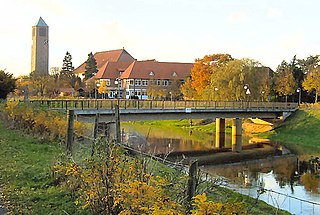
Löningen is a town in the district of Cloppenburg, in Lower Saxony, Germany. The town is situated on the river Hase, approx. 25 km southwest of Cloppenburg.
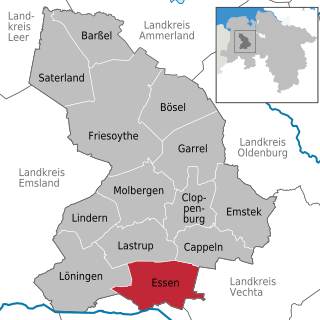
Essen (Oldenburg) is a municipality in the district of Cloppenburg, in Lower Saxony, Germany. It is on the river Hase, about 5 kilometres (3.1 mi) north of Quakenbrück and 15 kilometres (9.3 mi) southwest of Cloppenburg.
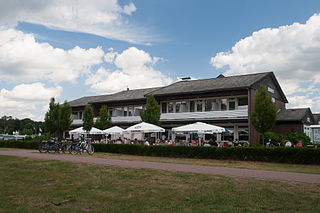
Garrel is a municipality in the district of Cloppenburg, in Lower Saxony, Germany. It is situated approximately 15 km north of Cloppenburg, and 25 km southwest of Oldenburg.

The Evangelical Lutheran Church in Oldenburg is a Lutheran church in the German state of Lower Saxony.
Clerical celibacy is the discipline within the Catholic Church by which only unmarried men are ordained to the episcopate, to the priesthood in the Latin Church, and similarly to the diaconate. In other autonomous particular churches, the discipline applies only to the episcopate. According to Jason Berry of The New York Times, "The requirement of celibacy is not dogma; it is an ecclesiastical law that was adopted in the Middle Ages because Rome was worried that clerics' children would inherit church property and create dynasties." For several hundred years after the imposition of celibacy on secular (non-monastic/religious) clergy the sale of church offices continued. The first male issue of non-married concubines of celibate clergy became set to continue the dynasty. To curtail this clerical abuse, the Latin Church imposed a ban on the ordination of bastards. This policy ended almost 800 years later in the 20th century.

The Evangelical-Lutheran Church of Saxony is one of 20 member Churches of the Protestant Church in Germany (EKD), covering most of the state of Saxony. Its headquarters are in Dresden, and the seat of the bishop is at Meissen Cathedral. Prior to the propagation of state atheism in the German Democratic Republic, it was the largest Evangelical Lutheran church in Germany.

Gerhard Feige is a German prelate of the Roman Catholic Church who has been bishop of the Roman Catholic Diocese of Magdeburg since 2005. Feige previously was the auxiliary bishop of the Diocese of Magdeburg from 1999 to 2005.

Franz-Josef Hermann Bode is German prelate of the Catholic Church who was bishop of Osnabrück from 1995 to 2023. He has been a bishop since 1991 and Deputy Chairman of the German Bishops Conference since 2017. Within that Conference, he is considered one of the strongest advocates of expanding the role of women in the Church.

Stefan Oster S.D.B. is a German prelate of the Catholic Church who has served as the Latin Church bishop of Passau since 2014.

Georg Bätzing is a German Catholic theologian who has been Bishop of Limburg since 2016 and chairman of the German Bishops' Conference since March 2020.

John IX of Haugwitz was Bishop of Meissen from 1555 to 1559 or 1581.

Stephan Burger is a German Roman Catholic clergyman. Since 2014 he has been Archbishop of Freiburg and Metropolitan Bishop of the Ecclesiastical Province of Freiburg.

Peter Kohlgraf is a German Catholic prelate who has served as Bishop of Mainz since 2017.
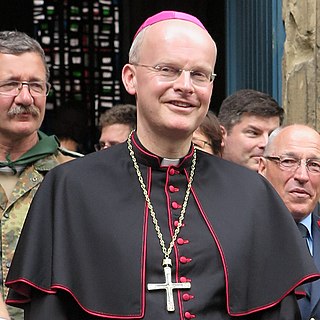
Franz-Josef Overbeck is a German bishop of the Catholic Church who has been bishop of Essen since 2009 and bishop of the German military since 2011.

Christof May was a German Catholic theologian and priest. He worked for the Diocese of Limburg, as Regens of the seminary, as Bischofsvikar responsible for development of the church, and as Domkapitular in the cathedral chapter. He advocated for changes in the Catholic Church.

Hans-Jochen Jaschke was a German Catholic prelate. He was auxiliary bishop of Osnabrück from 1989 to 1994 and of Hamburg from 1994 to 2016. He was responsible for ecumenism and inter-religious dialogue, and represented the Catholic Church in the media.
Dhaman Kumar Karanam MSFS is an Indian prelate of the Catholic Church who has served as Bishop of Nalgonda since 2024.
German bishops who have so far publicly voiced support for blessing same-sex unions include Cardinal Reinhard Marx of Munich and Freising, Bishop Franz-Josef Bode of Osnabrück, and Bishop Heinrich Timmerervers of Dresden-Meißen.